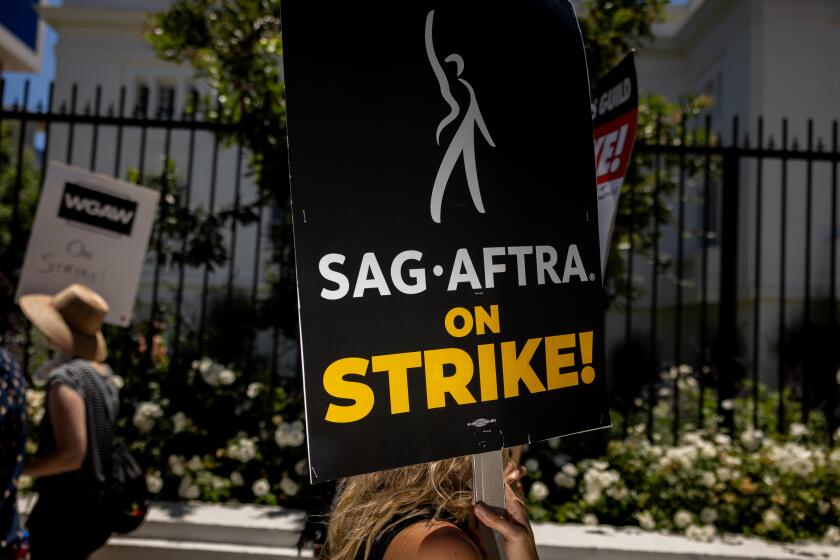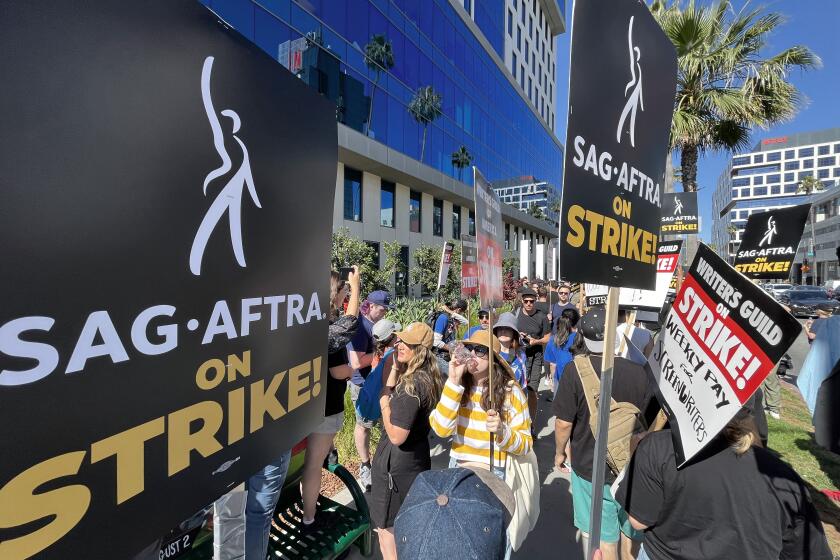Netflix adds 9 million subscribers in third quarter despite Hollywood strikes

- Share via
Netflix added 9 million subscribers during the third quarter, the Los Gatos, Calif., streaming video giant said Wednesday, citing popular original shows and older licensed content, as well as the company’s crackdown on password sharing and its budding advertising business.
Revenue was $8.5 billion in the quarter, up 8% from the same period last year, which was in line with analyst estimates. Net income was $1.68 billion, compared with $1.4 billion a year earlier. Netflix’s profit and subscriber numbers beat Wall Street’s expectations. Analysts on average had projected 6.1 million added subscribers and $1.57 billion in net income, according to FactSet.
Like other entertainment companies, the streamer has faced long strikes by screenwriters and film and TV actors that have roiled the industry. The Writers Guild of America strike ended in late September, but SAG-AFTRA’s strike, which began in mid-July, continues. Talks broke down last week between the actors guild and the major studios when the alliance of entertainment companies decided to walk away from negotiations.
But Netflix has so far been able to weather the production stoppages because of its large library of original content and the popularity of licensed titles such as the legal drama “Suits,” which has been a top streaming show in the U.S. since its arrival on the platform, according to Nielsen numbers. The company also said that its free cash flow is now expected to be around $6.5 billion this year, compared with its prior forecast of at least $5 billion, in part due to the money saved on production during the strikes.
SAG-AFTRA has approved a deal from the studios to end its historic strike. The actors were on strike for more than 100 days.
During the third quarter, Netflix launched programs including a live-action version of popular manga “One Piece,” the second season of coming-of-age drama “Heartstopper” and Season 5 of reality dating series “Love Is Blind,” which ranked fifth in last week’s Netflix’s top 10.
The company has expanded into new areas, including hosting its first live sports event, “The Netflix Cup,” in which drivers from the sports documentary series “Formula 1: Drive to Survive” and golfers from “Full Swing” will compete in a match play golf tournament in Las Vegas on Nov. 14.
Netflix on Wednesday announced a deal for David Ellison’s Skydance Media to produce animated content for Netflix. Skydance Animation, run by former Pixar leader John Lasseter, previously had a deal with Apple.
Additionally, Netflix has moved to increase its revenue by pressuring nonpaying users sharing passwords to buy a subscription and by offering a cheaper ad-supported plan.
The company continued to boost revenue by cracking down on nonpaying Netflix users who have been using shared passwords with friends and family. Nonpaying Netflix users can sign up for their own subscriptions or ad-free subscribers can pay an extra $7.99 a month in the U.S. to add people to their account who do not live in their household.
“The cancel reaction continues to be low, exceeding our expectations, and borrower households converting into full paying memberships are demonstrating healthy retention,” Netflix said in its shareholder letter.
“They’re really smart about how they’re doing it because it’s inoffensive,” said Michael Pachter, a managing director of equity research for Wedbush Securities.
To further improve profits, Netflix said it is raising prices on its ad-free basic and premium plans in the U.S. The basic plan will be $11.99, a $2 increase from the previous $9.99 a month. Premium subscribers will pay $22.99, up from $19.99. Prices also increased for those plans in Britain and France, the company said.
However, prices on standard and ad-supported plans will remain the same. Those tiers cost $15.49 and $6.99 a month, respectively. Streamers have been increasing prices as subscriber growth slows and companies are looking to raise more revenue.
“We think it’s a bad idea for customers but good for shareholders,” said Ray Wang, principal analyst at Constellation Research, on Netflix’s price increases. “In the long run, it will give Netflix better returns on more content.”
Streaming services including Netflix, Disney+ and Apple TV+ have increased their prices, as subscriber growth has slowed from the early days of the COVID-19 pandemic.
Netflix says it’s continuing to invest in its cheaper, ad-supported plan, which launched last year but has made changes to its leadership, with executives acknowledging its fledgling advertising business still has a long way to go.
Netflix co-Chief Executive Ted Sarandos said at the Bloomberg Screentime conference, “We’re definitely in our infancy, and it’s definitely not at the scale that we want it to be at yet.”
Earlier this month, Netflix announced the exit of Jeremi Gorman, who was credited with building the streamer’s ads business, and said Amy Reinhard, Netflix’s former vice president of studio operations, would be president of advertising.
The company said on Wednesday that the number of its customers on the cheaper ad-supported plan continues to grow, with membership up almost 70% quarter over quarter, but has not said how many people subscribe to that version. The ad-based tiers account for roughly 30% of signups in the countries where Netflix offers its service with commercials.
Negotiations between actors union SAG-AFTRA and the Hollywood studios hit a snag Wednesday, ending with the AMPTP saying it had suspended negotiations.
Netflix also said it would adjust its executive compensation structure in response to widespread concerns shareholders have voiced for years. “We are listening to our shareholders and plan on substantial changes for 2024 to a more conventional model,” Netflix said. “Our executive compensation plan will continue to be built on pay for performance.”
Netflix shares closed Wednesday at $346.19 a share, down 2.7%. They rose 12% in after-hours trading.
More to Read
Inside the business of entertainment
The Wide Shot brings you news, analysis and insights on everything from streaming wars to production — and what it all means for the future.
You may occasionally receive promotional content from the Los Angeles Times.














